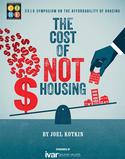In a recent column in the Sunday Independent, Ireland's largest weekend newspaper, one of Ireland's leading economists, Colm McCarthy of University College (Dublin) raised the prospect another housing bubble in Dublin, Ireland's leading weekend newspaper. Dublin is the nation's capital and home to approximately 40% of the population. read more »
Housing
Luxury Urban Housing, Built on a Myth, Is About to Take a Big Hit
From steamy Miami to the thriving cores of cities from New York, San Francisco, Houston and Chicago, swank towers, some of them pencil thin and all richly appointed. This surge in the luxury apartment construction has often been seen as validation of the purported massive shift of population, notably of the retired wealthy, to the inner cities. Indeed with the exception of a brief period right after the Great Recession, there was slightly greater growth in core cities than the suburbs and exurbs. It was said that we were in the midst of a massive “return to the city.” read more »
- Login to post comments
Finally! Great New Affordable Bay Area Housing!
These are highly educated well paid workers at a San Francisco tech company. They’re mostly young. Some are single. Some are newly coupled. Some are married with young children. There are exceptions, but they tend to want to live in a vibrant urban neighborhood with a short commute rather than a distant suburb. read more »
The Cost of NOT Housing: A New Report
This is the introduction to an new report "The Cost of NOT Housing" authored by Joel Kotkin for the National CORE Symposium on Affordability of Housing. Download the entire report (pdf) here.
It is a commonplace view that housing does not contribute to the overall fiscal and economic condition of cities. Recent trends—both nationally and here in California—suggest that this is not the case. New housing, including affordable units, provide some direct stimulation through construction jobs, but also allow people, particularly young families, to stay, work and shop locally. Lack of affordable housing ultimately drives people, particularly the entry level and young educated, out of regions where their labor would be coveted by local companies. read more »
- Login to post comments
Are Compact Cities More Affordable?
Housing affordability has been a tenacious and intractable urban problem for as long as stats have been kept. Several cities recently declared it a crisis. But what kind of problem is it? Opinions vary widely. An economic problem, or a social one? A land resource issue? Or, as traded wisdom would have it, the result of reliance on the wrong urban form? Proposed solutions vary accordingly. Now, new evidence rules out one potential source of unaffordable housing: clearly, it is not an urban form problem. The widely-believed theory that a city's lack of affordable housing can be fixed with increased compactness — when combined with public transit — is apparently wrong. read more »
Manhattan Ultra-Luxury ‘Battling the Serpent of Chaos’
The deceleration of China and resulting commodities crash have created a problem for developers of ultra luxury condominiums.
The ancient Egyptians believed that the sky was a solid dome, the belly of the goddess Nut who arched her body from one side of the horizon to the other. Every day, the sun god Ra emerged in the east and sailed in his boat across the sky until dusk when he disappeared in the west by dipping below the surface of Nun, the ocean upon which the whole flat earth floated. read more »
- Login to post comments
Millennial Home Ownership: Disappointment Ahead in Some Places?
Millennial renters overwhelmingly plan on buying their own homes, though affording them could be far more challenging than they think. This is an important conclusion from a renters’ survey by apartmentlist.com, an apartment search website (See: The Affordability Crisis: Are Millennials Destined to be Renters?). read more »
Liberals — Except When it Comes Home
My old boss, Bruce Brugmann, who ran the Bay Guardian, told me early on in my career that you could tell the real politics of a big-city newspaper by the person they endorse for mayor.
Nice liberal outfits like the New York Times support Democrats for president and (typically) governor and US Senate. The SF Chronicle doesn’t endorse many Republicans any more. But when it comes to the local stuff, the decisions on who should run the city where they live and operate and connect with the power structure, the truth comes out. read more »
The Foreclosure Crisis: At the Movies
If you haven’t seen The Big Short, the movie version of Michael Lewis’s fascinating book about the explosion of the housing bubble, you should see it for the entertainment value alone. The film tells an important story with humor, relative accuracy and strong acting. It is so good that it has been nominated for an Academy Award for best picture. But the film largely ignores the experiences of the homeowners who signed notes and mortgages that backed the securities and derivatives that the film describes. A decade later, millions of working-class homeowners are still suffering from results of the greed and recklessness so well documented by the movie. read more »
- Login to post comments
Suburban Sustainablity
There’s a philosophical debate about what is “sustainable.” The two dominant camps tend to advocate on behalf of either the hyper efficient dense city or bucolic rural self sufficiency. Personally, I’m not a fan of either. read more »






















